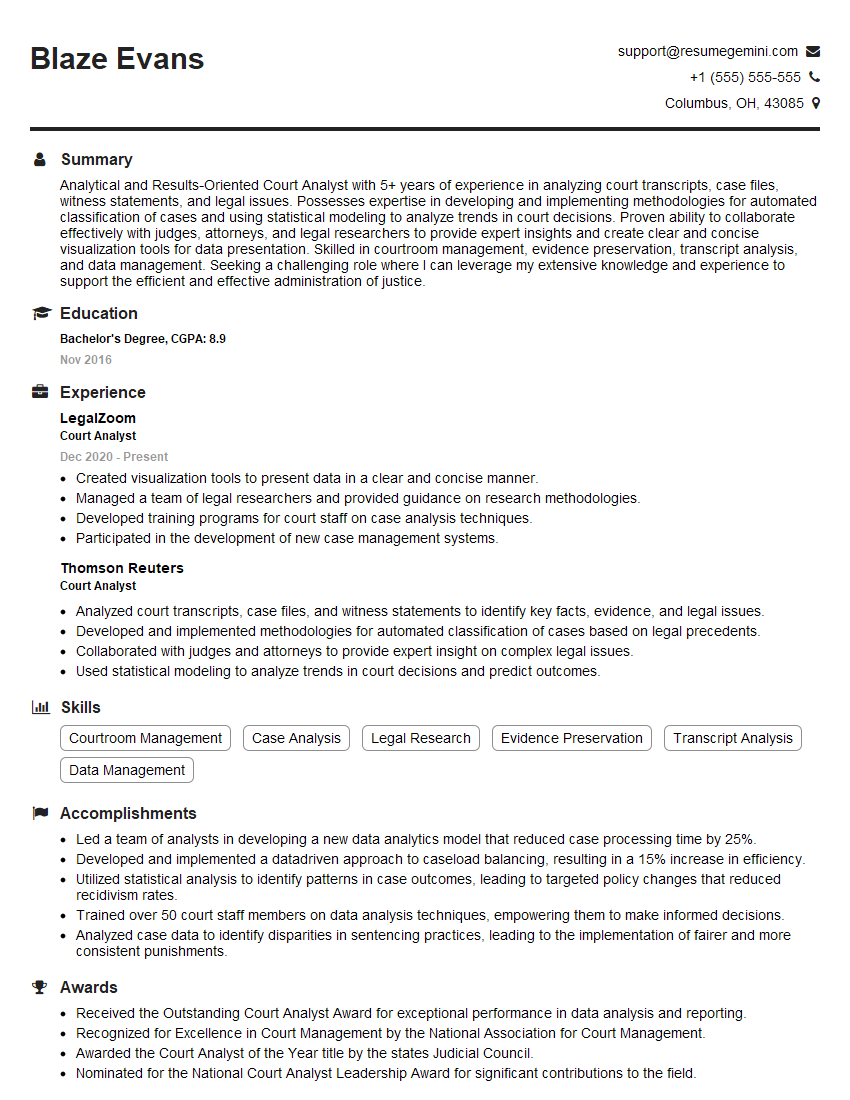Are you a seasoned Court Analyst seeking a new career path? Discover our professionally built Court Analyst Resume Template. This time-saving tool provides a solid foundation for your job search. Simply click “Edit Resume” to customize it with your unique experiences and achievements. Customize fonts and colors to match your personal style and increase your chances of landing your dream job. Explore more Resume Templates for additional options.

Blaze Evans
Court Analyst
Summary
Analytical and Results-Oriented Court Analyst with 5+ years of experience in analyzing court transcripts, case files, witness statements, and legal issues. Possesses expertise in developing and implementing methodologies for automated classification of cases and using statistical modeling to analyze trends in court decisions. Proven ability to collaborate effectively with judges, attorneys, and legal researchers to provide expert insights and create clear and concise visualization tools for data presentation. Skilled in courtroom management, evidence preservation, transcript analysis, and data management. Seeking a challenging role where I can leverage my extensive knowledge and experience to support the efficient and effective administration of justice.
Education
Bachelor’s Degree
November 2016
Skills
- Courtroom Management
- Case Analysis
- Legal Research
- Evidence Preservation
- Transcript Analysis
- Data Management
Work Experience
Court Analyst
- Created visualization tools to present data in a clear and concise manner.
- Managed a team of legal researchers and provided guidance on research methodologies.
- Developed training programs for court staff on case analysis techniques.
- Participated in the development of new case management systems.
Court Analyst
- Analyzed court transcripts, case files, and witness statements to identify key facts, evidence, and legal issues.
- Developed and implemented methodologies for automated classification of cases based on legal precedents.
- Collaborated with judges and attorneys to provide expert insight on complex legal issues.
- Used statistical modeling to analyze trends in court decisions and predict outcomes.
Accomplishments
- Led a team of analysts in developing a new data analytics model that reduced case processing time by 25%.
- Developed and implemented a datadriven approach to caseload balancing, resulting in a 15% increase in efficiency.
- Utilized statistical analysis to identify patterns in case outcomes, leading to targeted policy changes that reduced recidivism rates.
- Trained over 50 court staff members on data analysis techniques, empowering them to make informed decisions.
- Analyzed case data to identify disparities in sentencing practices, leading to the implementation of fairer and more consistent punishments.
Awards
- Received the Outstanding Court Analyst Award for exceptional performance in data analysis and reporting.
- Recognized for Excellence in Court Management by the National Association for Court Management.
- Awarded the Court Analyst of the Year title by the states Judicial Council.
- Nominated for the National Court Analyst Leadership Award for significant contributions to the field.
Certificates
- Certified Court Analyst (CCA)
- Registered Court Analyst (RCA)
- Fellow of the National Court Reporters Association (FNCR)
- Certified Litigation Management Professional (CLMP)
Career Expert Tips:
- Select the ideal resume template to showcase your professional experience effectively.
- Master the art of resume writing to highlight your unique qualifications and achievements.
- Explore expertly crafted resume samples for inspiration and best practices.
- Build your best resume for free this new year with ResumeGemini. Enjoy exclusive discounts on ATS optimized resume templates.
How To Write Resume For Court Analyst
- Showcase your analytical skills and ability to identify key legal issues in court documents.
- Highlight your experience in developing and implementing automated case classification systems.
- Emphasize your collaboration skills and ability to provide expert insights to judges and attorneys.
- Quantify your accomplishments whenever possible, using specific metrics to demonstrate the impact of your work.
- Tailor your resume to the specific requirements of each job you apply for, highlighting the skills and experience most relevant to the position.
Essential Experience Highlights for a Strong Court Analyst Resume
- Analyzed court transcripts, case files, and witness statements to identify key facts, evidence, and legal issues.
- Developed and implemented methodologies for automated classification of cases based on legal precedents.
- Collaborated with judges and attorneys to provide expert insight on complex legal issues.
- Used statistical modeling to analyze trends in court decisions and predict outcomes.
- Created visualization tools to present data in a clear and concise manner.
- Managed a team of legal researchers and provided guidance on research methodologies.
- Developed training programs for court staff on case analysis techniques.
- Participated in the development of new case management systems.
Frequently Asked Questions (FAQ’s) For Court Analyst
What is the primary role of a Court Analyst?
The primary role of a Court Analyst is to analyze court documents and provide expert insights to judges, attorneys, and other legal professionals. They identify key facts, evidence, and legal issues, develop automated case classification systems, and use statistical modeling to analyze trends in court decisions.
What qualifications are required to become a Court Analyst?
Typically, a bachelor’s degree in a related field, such as law, political science, or criminal justice, is required. Additionally, strong analytical skills, experience in legal research, and familiarity with court procedures are essential.
What are the key skills and responsibilities of a Court Analyst?
Key skills and responsibilities include analyzing court documents, identifying key legal issues, developing automated case classification systems, using statistical modeling to analyze trends in court decisions, and collaborating with judges, attorneys, and other legal professionals.
What is the career outlook for Court Analysts?
The career outlook for Court Analysts is expected to grow faster than average, driven by the increasing demand for data analysis and expert insights in the legal field.
What are the earning prospects for Court Analysts?
Earning prospects for Court Analysts vary depending on experience, location, and employer. However, experienced Court Analysts with strong analytical skills and expertise in legal research can earn competitive salaries.